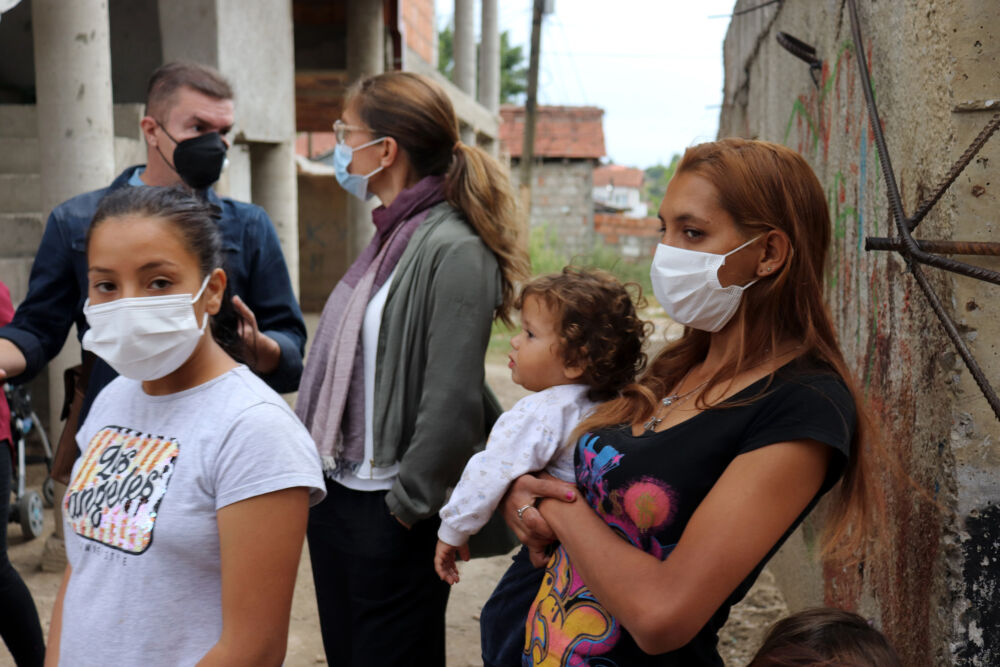Viable alternative for the poor and marginalized in North Macedonia
Date
September 13, 2021
From the visit of the Roma settlement Bavci in Kumanovo, North Macedonia. Photo by Ljiljana Mitevska
In Europe region the corona crisis is directly affecting food systems by impacting food supply and demand, and indirectly by decreases in the purchasing power of the people, the capacity of farmers to produce and more importantly sell their agricultural products, as well as intensification of the care work done by women. All of this has stronger impact and harsher effect on the poor and vulnerable.
As a response to this, We Effect Europe has started a new project at the beginning of the year, focused on market system development (MSD). This unique approach aims to support rural and poor communities’ recovery amid the ongoing Covid – 19 crisis by addressing the underlying causes of market failure, accelerating food system transformation, creating jobs and long-lasting sustainability.
Half a year into the project, we had the honour of hosting a Swedish Embassy and Swedish International Development Cooperation Agency (Sida) delegation in North Macedonia.
Swedish Ambassador to North Macedonia, Kristin Forsgren Bengtsson, Sida’s Senior Advisor Lollo Darin and Sida’s Head of Development Cooperation for North Macedonia, Mikael Atterhog, had the chance to experience the challenges that farmers, rural communities and marginalized Roma population in North Macedonia are facing during these trying times and how our new IISEE project can help mitigate some of the consequences.
Our first stop was the dairy farm of Vangelina Parmachka, woman farmer who produces organic sheep’s cheese the traditional way, that she is now selling to a wide network of private buyers and restaurants.
In the mountainous region of Maleshevo where the main source of income for the majority of the population is farming and gathering wild forest products, we meet with a group of local women involved in collecting and processing of wild blackberries, raspberries, rosehips, mushrooms etc.
Faced with problem of having difficult access to market, they expressed interest for a future utilization of the first food hub in the country, located in their city Pehcevo and established within the frames of our project.
Our short stop to the food hub showed us its potential of becoming an organisation that can manage the processing, distribution and marketing of the food products of the local producers in order to strengthen their capacity in retail or wholesale.
At the hub we also met with young Dusica Krsteska, one of the food hub operators who processes locally grown fruits producing jams and juices. She is hopeful that the food hub will succeed in becoming an intermediary business that connects producers with buyers.
Talking about the need for a greater participation of women and young people in the food systems and on the market, Regional Director Anneli Leina said: “Building inclusive markets means engaging and ensuring benefit for a wide range of actors, including the poor, women, youth, and the marginalised communities.”
On our last visit in Kumanovo, we met with the most marginalized community in the country – the Roma community. In the isolated settlement Bavci, the Roma people are living in substandard housing, some of them without reliable water and sanitation. A fairly good portion of them without regulated residence or ID card, they live on the margins of the society performing low paid jobs in the grey economy.
In conversation with the local Roma, discussing some of the burning issues for this community, Ambassador Bengtsson emphasized that “in order to ensure the wellbeing of the future generations, the best present that any of us can give to our children is – education!”
The field visit enabled our Swedish guests to have a direct insight into how the project can contribute to the wellbeing of the poor and marginalized in North Macedonia.
Sida representatives Lollo Darin and Mikael Atterhog expressed great satisfaction with the organized tour, saying that it has enabled them to have a good overview and insight into the project. This made them more aware of the real problems that the farmers and the marginalized Roma population are facing on the ground, but they also see a lot of hope for improvement of the situation.
The IISEE project, funded by Sida, is a three-year project focused on several regions in North Macedonia and is being implemented by all three partner organisations of We Effect in the country: the National Federation of Farmers (NFF), the Rural Development Network of North Macedonia (RDN of NM) and the National Roma Centrum (NRC).